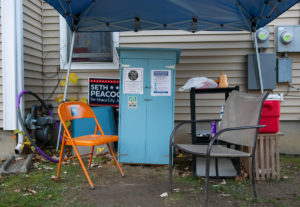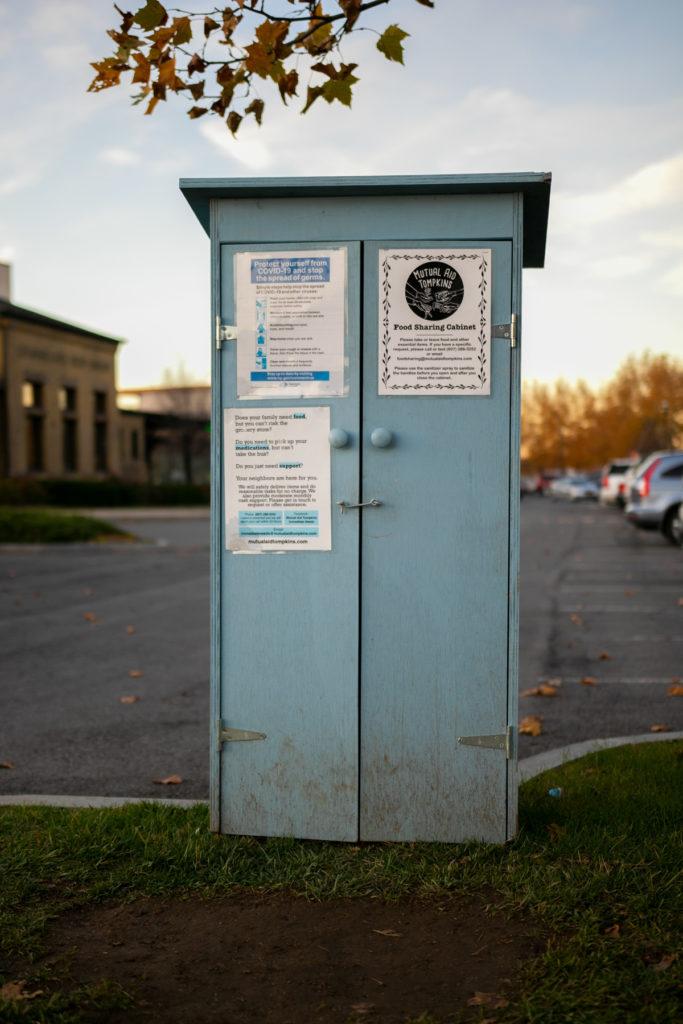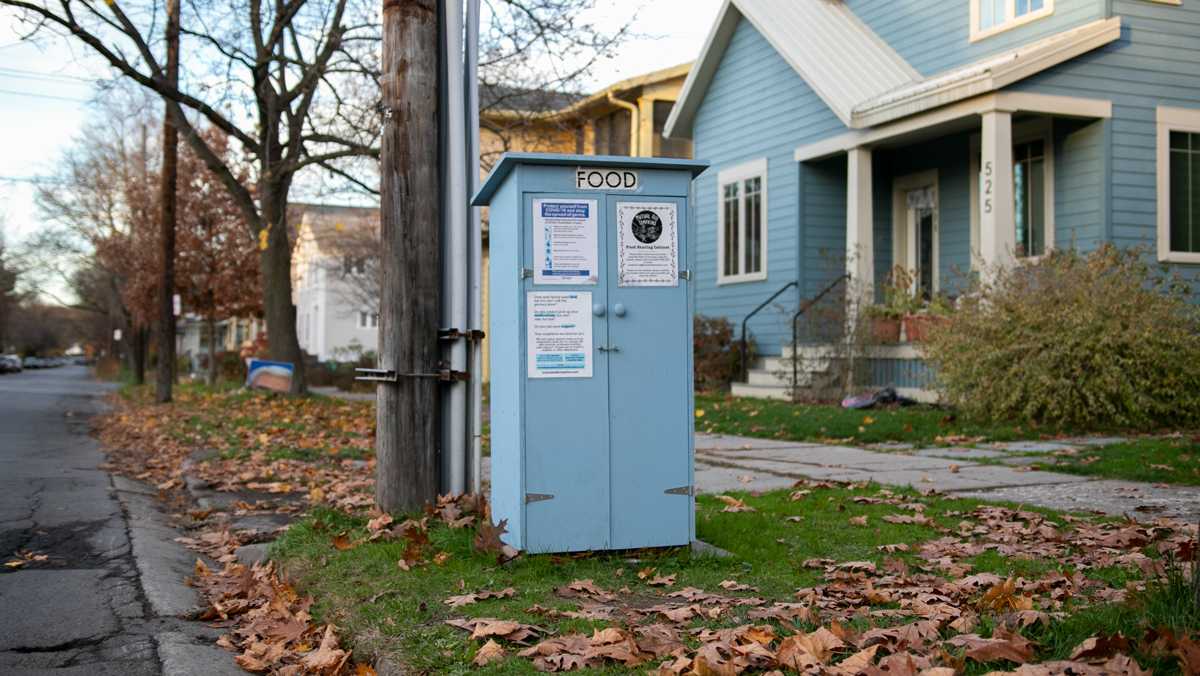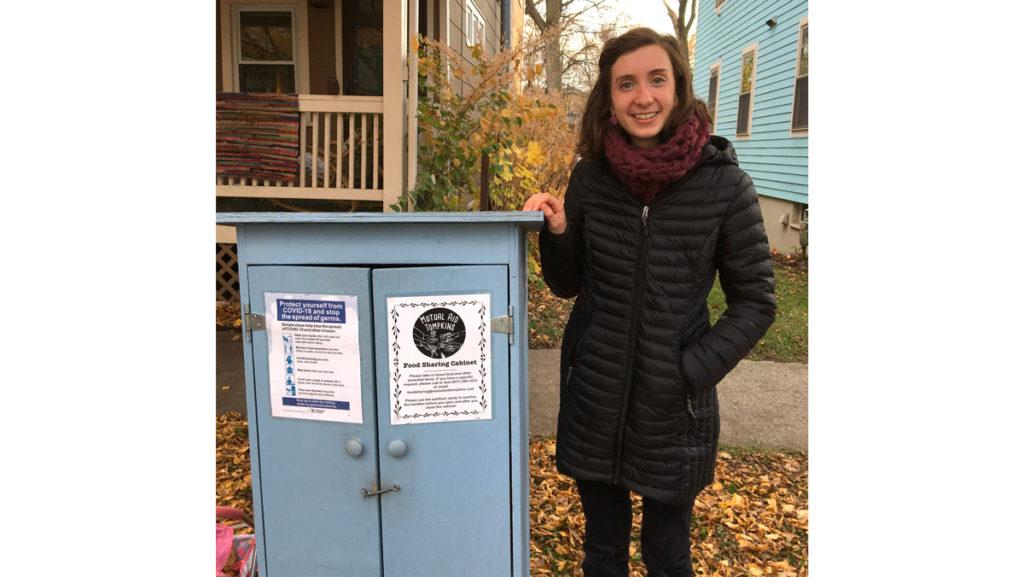Small blue cabinets from Mutual Aid Tompkins stocked with nonperishable food and toiletries are scattered throughout Tompkins County. These cabinets are part of a project that Ithaca College alum Elizabeth Jesch ’20 works on as the food sharing coordinator of Mutual Aid Tompkins. These cabinets aim to foster a sense of community during the COVID-19 pandemic, a time when food insecurity is heightened.
Jesch graduated with a bachelor’s degree in public and community health with a focus on nutrition promotion. She now works toward food security as part of the AmeriCorps Volunteers in Service to America (VISTA) in Ithaca. She said that working with Mutual Aid Tompkins has been a rewarding experience that has shown her the importance of togetherness in the face of adversity.

“It’s really centered around the idea of neighbors helping neighbors to meet their basic needs of survival,” Jesch said. “What I’ve come to see through that organization is that the cabinets are functioning as a method of neighborhood stewardship. They create these systems of interdependent community care where communities come together to meet food security needs.”
In an effort to combat a rise in food insecurity, food pantries and community kitchens in Tompkins County have reworked their operations to accommodate the increase in need. One organization that students from the college, including Jesch, have volunteered at is Loaves & Fishes, a community kitchen in St. John’s Episcopal Church. The kitchen has provided free meals five days a week for the past 37 years and has continued to offer these services throughout the pandemic.
Reverend Christina Culver, executive director of the kitchen, said that the need for this service has increased dramatically. She said that Loaves & Fishes volunteers have been serving approximately 250 meals a day and 1,200 meals a week — three times the number of meals they typically serve.
Culver said that in order to address this increasing need while keeping volunteers and recipients safe, the organization has changed its protocols. Some of the biggest changes at the kitchen include prepackaging meals, no dining in the establishment and a new volunteer system that restricts anyone under 25 years old from volunteering in order to reduce the risk of COVID-19. Culver said that this was a big decision because prior to the pandemic, it was dependent on many student volunteers.
One of the positive outcomes of reworking these protocols has been the new delivery system that allows the kitchen to further serve the community, Culver said. The kitchen has been feeding people who may not have used the resource in the past, including people who live in an area near Elmira Road referred to as The Jungle, an encampment for people who are unable to find housing accommodations in Ithaca.
Culver said that before the pandemic, the kitchen collaborated with the Department of Social Services to do outreach during mealtimes. She said that because the kitchen is now working to feed the communities identified as most vulnerable by social services, this relationship has strengthened.
“Our social services in this county are pretty amazing, and the people who work in them and our community [are] very generous,” Culver said. “People haven’t stopped caring, even though they’re going through this stressful time.”
Tompkins County is not alone in the battle against rising food insecurity. In 2019, 13.7 million American households faced food insecurity prior to the pandemic, according to NPR. Additionally, Black and Hispanic Americans are twice as likely to face food insecurity compared to white Americans, and people with a disability are two times more likely to experience food insecurity than able-bodied citizens.
A study conducted by Northwestern University indicates that COVID-19 has more than doubled the number of

people facing food insecurity and disproportionately affected marginalized communities. According to the U.S. Census Bureau’s Household Pulse Survey from April 23 to May 19, 36% of Black Americans and 32% of Hispanic Americans faced food insecurity in comparison to white Americans — 18% of whom faced food insecurity.
This increase in food insecurity has resulted in more Americans depending on government programs like the Supplemental Nutrition Assistance Program (SNAP). The use of SNAP increased by 17% from February to May, according to The New York Times. Approximately 6 million Americans received food stamps for the first time during the first three months of the pandemic.
Jesch said that now more than ever, there is a need for nutritional resources, especially in Tompkins County. She said the county’s main food bank, the Food Bank of the Southern Tier, has seen an increase in overall distribution of 78% from March to June 2020, compared to 2019.
“I just think it shows the nature of how many people are being impacted by food insecurity for the very first time in their lives as a result of COVID,” Jesch said.
Senior Bianca Summerville said that she has been a volunteer at the Food Bank of the Southern Tier for the past few years. Summerville said that this summer, she helped with community food distributions at the food bank as an AmeriCorps volunteer. This drive-thru distribution was created as a direct response to COVID-19 and runs twice a week, serving up to 500 households at a time, she said.
“It can be so incredibly gratifying,” Summerville said. “You’re just like, ‘Wow, these people get to go home and eat because of the work I did today.’ But then at the same time, these people are only here because we have, quite frankly, a social support system that is failing. None of this should be needed. None of this should be happening. So it’s incredibly frustrating … to see so many people in need of food.”
In 2016, 36% of students at the college said they struggle to afford food, as previously reported by The Ithacan. At the time, the college’s meal plan was less cost–efficient and offered plans of seven, 10, 14 or unlimited meals a week. Students resorted to limiting their food intake and reducing their meal plans. The college identified resources like the Food Bank of the Southern Tier’s mobile food pantry, but it was reported that it was still struggling to find more long-term solutions.
Lauren Goldberg, executive director of Hillel at Ithaca College, said she has become more aware of how quickly food insecurity can become a reality. Goldberg is the adviser for Swipe Out Hunger, an on-campus initiative run by Hillel in which students and faculty members can donate and receive meal card swipes in an effort to reduce on-campus food insecurity. The program is part of a national organization that aims to reduce hunger on college campuses throughout the country.
Goldberg said that this initiative is on pause for the semester, as students are not living on campus. However, she said that Swipe Out Hunger is going to be an important initiative to combat food insecurity next semester.
“These meals, they’re a gift of what in the Jewish tradition we call ‘tzedakah,’” Goldberg said. “It translates to justice. And that’s because this is not a gift of charity. This is equity.”
The Pantry, the college’s on-campus food pantry, is still open. Doreen Hettich-Atkins, executive director of the Division of Student Affairs and Campus Life and chair of the college’s food insecurity committee, said that she communicates with faculty members to assure The Pantry is a viable resource for students.
Hettich-Atkins said that for students in the local community, The Pantry has been essential these past eight months, with 50 to 75 people coming in every week. However, she said that The Pantry functions differently in the pandemic because of safety precautions. There is only one staff member who walks students down to the pantry, unlocks the doors and lets them get what they need. The pantry also has masks, gloves and cleaning supplies available to ensure students are staying safe.

Meaghan Sheehan Rosen, Friendship Donations Network coordinator, said that the college has previously collaborated with the organization — which redistributes food from local grocery stores and farmers to people who may not have access to fresh, nutritious food — picking up leftover food from Ithaca College Dining Services at the end of each semester. The organization also worked with Stop Wasting Ithaca’s Food Today (SWIFT), an on-campus initiative in which students redistribute unused food from the dinings hall every Friday afternoon.
Sheehan Rosen said that Friendship Donations Network has not been working directly with the college during the pandemic but is instead continuing to redistribute food from other partners. Sheehan Rosen also said that Friendship Donations Network received many donations at the beginning of the pandemic. The organization also purchased food from local farmers in an initiative called Nourish Tompkins in partnership with the Cornell Cooperative Extension.
“It was reassuring for us in a lot of ways that we were able to adapt quickly after the pandemic started, which I think was a testament to the strength of our organization,” Sheehan Rosen said. “We have always intentionally tried to try to do things as simply and efficiently as possible and stay small enough so that we can be flexible.”
Jesch said that students should get involved, whether it be by volunteering at a food pantry or donating to an organization, because one person’s actions make a difference.
“Complex problems like food insecurity can only be successfully targeted when we come together as a community and work collaboratively together with a group of really diverse perspectives and people who bring different experiences to the table,” Jesch said. “I hope that students know that their voices really matter and that they can make change in their communities.”
Correction: A previous version of this article stated the Food Bank of the Southern Tier saw a 78% increase in distribution at its mobile food pantries. In reality, this increase was from overall distribution from March to June 2020, not just from mobile food pantries.









